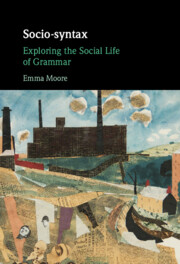Book contents
- Socio-syntax
- Socio-syntax
- Copyright page
- Dedication
- Contents
- Figures
- Tables
- Acknowledgements
- 1 Why Does the Social Meaning of Grammar Matter?
- 2 The Social Landscape of Midlan High
- 3 How Do We Study the Social Meaning of Grammatical Variation?
- 4 How Free Are We to Vary the Grammar We Use?
- 5 How Do We Use Grammar to Design Our Talk?
- 6 Does Everyone Use Grammar to Make Social Meaning?
- 7 How Does Grammar Combine with Other Elements of Language?
- 8 What Does It Mean to View Grammar as a Fluid, Flexible Social Resource?
- References
- Index
8 - What Does It Mean to View Grammar as a Fluid, Flexible Social Resource?
Published online by Cambridge University Press: 19 October 2023
- Socio-syntax
- Socio-syntax
- Copyright page
- Dedication
- Contents
- Figures
- Tables
- Acknowledgements
- 1 Why Does the Social Meaning of Grammar Matter?
- 2 The Social Landscape of Midlan High
- 3 How Do We Study the Social Meaning of Grammatical Variation?
- 4 How Free Are We to Vary the Grammar We Use?
- 5 How Do We Use Grammar to Design Our Talk?
- 6 Does Everyone Use Grammar to Make Social Meaning?
- 7 How Does Grammar Combine with Other Elements of Language?
- 8 What Does It Mean to View Grammar as a Fluid, Flexible Social Resource?
- References
- Index
Summary
What does it mean to view grammar as a fluid, flexible social resource? For linguists, it requires attending to the pragmatic consequences of syntactic items being structured in particular ways whilst accounting for any indexical links that grammatical variants have to social types. For those interested in educational issues, it means conceptualising grammar, not as rigid and inflexible, but as a semiotic resource for meaning-making. This book has demonstrated that the intertwined nature of language and persona is perhaps the most powerful constraint on language use in the school years. Consequently, by focusing on the social meaning of grammar we would work with children’s experiences, rather than against them. What might happen if children are encouraged to view their syntactic variability as a linguistic skill, rather than as something to be overcome in favour of linguistically uniform ‘standards’? Whilst it is well established that misconceptions about social class groups and their language varieties perpetuate social inequalities, this chapter also argues that misconceptions about how grammar functions also serve to disadvantage children by underestimating their linguistic skills.
- Type
- Chapter
- Information
- Socio-syntaxExploring the Social Life of Grammar, pp. 207 - 232Publisher: Cambridge University PressPrint publication year: 2023

